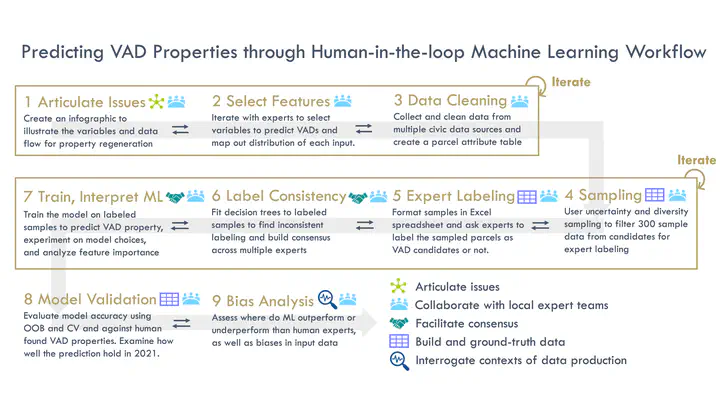Detecting vacant, abandoned, and disinvested properties in Savannah Georgia through human-in-the-loop machine learning
 Human-in-the-loop machine learning workflow
Human-in-the-loop machine learning workflow(Accepted for Publication at Journal of Planning Education and Research, Leading author)
This work is developed with Dr. Clio Andris at Georgia Institute of Technology and Senior Planner Brian Brainerd. Click to see open-access version of the final paper at arxiv.
Friendly Cities Lab has a new collaboration with the City of Savannah to strategize decisions to address vacant and blighted properties in the community. Neighborhoods experiencing blight suffer from safety concerns and lower housing values, leading to suboptimal living conditions for already marginalized residents. Savannah’s Housing & Neighborhood Services Department also estimated that every blighted property bleeds $1300 of public funds annually. These funds are used to cover the unrecoverable costs of overgrown grass, litter, illegal dumping, securing open structures, and demolishing properties. In 2019, local voters approved the use of 10 million dollars to acquire and redevelop of at least 1,000 abandoned, blighted residential properties over the next 10 years to effect meaningful change in neighborhoods long neglected or exploited by profit-driven investors. However, strategizing which properties to intervene first and what kinds of interventions can be best applied for equitable development remains a challenge.
Our research revolves around developing a human-in-the-loop machine learning model to help the city identify vacant, abandoned, and disinvested (VAD) properties. Our model has three specific features that distinguish it from existing M.L.-based parcel-finder models: 1) a human-in-the-loop approach to train the model with “active learning” techniques that incorporate local experts’ tacit knowledge, 2) interpretable machine learning methods to find discrepancy in expert-labeled data and build consensus, and 3) empirical analyses of human and machine biases in identifying VAD properties to prompt further actions. As such, a contribution of this work is a method for helping civic properties’ condition and preempt deterioration that adversely affects neighborhoods and residents. Another contribution of this case study is to exemplify the development of a civic technology that balance the pursuit of efficiency as well as collaboration, context, and bias awareness.
This project is funded by the Georgia Smart Communities Challenge 2020 jointly with Brian Brainerd of the City of Savannah.